Star Date: July 2011
Malawi
Hello Dear Family & Friends!
“Palibe Vuto”
( No Worries! Malawian Chichewa)
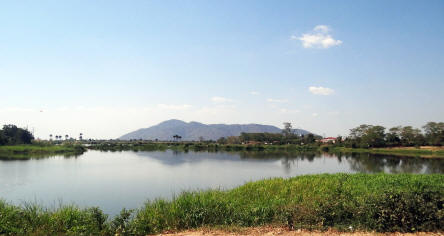

The beautiful vegetables were only surpassed by the beautiful smiles.
“Born of a vision. Continuing out of
passion…”
Live your Wildest Dreams! As we start our 9th year of continuous travel we are still amazed at the diversity of this remarkable planet we share. Learning every day, we continue on, exploring the vast continent of Africa. We topped 100,000 visitors to our website last month. We are happy to have so many interested people join us from over 120 countries worldwide. I started the website, with no previous experience, to be able to send photos to family and a few friends (pfb – pre Facebook). Like our trip, just doing everything by the seat of our pants, I simply upload a page each month filled with thoughts that come to mind and favorite photos Joseph has taken of the country we visit. Our goal is “Sharing the World With You” and to “Awaken the Unknown”. We were shocked a year ago when our provider supplied us with monthly statistics, welcoming so many thousands of interested visitors along on our journey. What started as a dream, then a day dream while gazing out across the ocean, evolved into selling or giving everything away from our life in Hawaii; and embarking on a 25 year adventure to explore the far corners of this incredible orb we share. Thanks for joining us and for passing our website along. Turn off the news. Help replace media misinformation about our planet with truth, turning fear of the unknown into knowledge and love.
Malawi – ‘The Warm Heart of Africa’. This tiny country in central Africa is home to some of the friendliest, most peace-loving, polite people in Africa. Wide smiles greet you at every turn and a walk through a village makes you feel like you are the prodigal son coming home. Malawi is not a wealthy country but their riches are in the people. A simple village lifestyle can teach us how to leave the stress behind and enjoy what is happening at the moment. When the work is done people sit around under the shade of a palm tree or baobab tree talking and laughing the day away. There is a quality of life, family life, that has been forgotten in the west. This laid back attitude permeates through the marketplace where social interaction is more important than economic exchange. Hours of operation? Whenever the shopkeeper feels like rolling up the woven blind. Touts don’t hound you to buy their wares or locals don’t beg endlessly, only occasionally are you asked for money and a simple, “No, thank you.” ends that with a smile. Instead a visitor is greeted with a welcoming smile and, “Can I help you?” Part of this is due to the fact that Malawi is off the beaten track. Few travelers make it here and thus locals haven’t become jaded by overbearing foreigners. It works both ways. This is a destination to get a rare feel of the ‘real’ Africa.
Curiosity reigns supreme as we slowly made our way from Mozambique to the largest commercial center of Blantyre. Parked under a massive baobab tree we were immediately enveloped by villagers of all shapes and sizes. Chatting with the owner of the small plot we asked permission to spend the night. Before we knew it we had over 30 adults and children out to see who had just appeared in their village. We are a rolling ‘one van band’ and never seem to disappoint the crowd! We have learned to enjoy our time with the locals then say something like, “We have to take a nap now, we are tired from driving.” Down go the shades and when the show is no longer interesting slowly the crowd disperses. Whew! The most tenacious audience were the sheep herders in Lesotho. With nothing to do and no where to go they would hang around forever hoping for more interaction. Eventually even they got bored. Actually there was one guy who may still be sitting there in the hopes of our return. We consider ourselves ambassadors. We may be the only personal contact that locals have had with a ‘muzungu’ or white person. We hope to leave a positive impression.
Our guard down, a young man who we had given a ride in Mozambique, in gratitude grabbed our camera as he left the van. Member of the 5% club! Located in the green mountains of Malawi we picked Blantyre out on the map as a place to have our replacement sent – (thanks for helping Mark & Marie!) We enjoyed the vibrant market and bustling tree lined streets of both Blantyre and Limbe. We met friendly Derek and his mechanic cousin Eddy who proceeded to help us with everything from allowing us a place to park the van, to extending our visa for another month. Such kindness softened the blow of less than clockwork events to be sorted out. The package long overdue, we finally sat in the office of the Manager of the Post Office and stated we would remain in his office until the parcel was located. Sure enough it had arrived 5 days earlier and within hours we had our new camera in hand. Then a simple 2 hour vehicle repair grew into a week as parts were sought out and eventually created by a couple of ingenuous repairmen. O.k., enough with the patience lessons! Petrol shortages raged as arguments broke out at the pumps. Like speculating stockbrokers people would line up at petrol stations for up to 24 hours just to fill up. Once the gas truck never came and the drivers were irate. After waiting 6 days to fill up, luckily within view of the pumps, Joseph drove down the wrong side of the road, over 2 cones and parked smack dab in front of the pump. He explained that we had been waiting almost a week to drive to the lake and once we topped up our 1/2 full tank, they could continue their arguing. Another desperate driver drove his new car so close to our bumper that he dented the full length of his car just to get behind us. Bedlam. Tank full we were finally on our way.
Up on this high plateau it is possible to look in all directions and see the mountains in the distance. Cloud laced Mt Mulanje stands above the rest. Malawi’s famous porters ‘tenga-tengas’ literally ‘those who carry’ are ready to help fit hikers explore the peak. Prone to sudden changes in weather a harrowing account is highlighted in van de Post’s “Venture to the Interior”. Too stubborn to follow the advice of the ‘tenga-tengas’, proved to be a fatal error. The granite summit looms at over 3000m (9,000 ft) and is called ‘Sapitwa’ – literally “Don’t Go There!” a challenge to climbers around the world. Scaling this massif requires endurance rather than technique. If you aren’t into pain it is possible to enjoy the forested slopes below, home to the quickly disappearing giant cedars, rushing waterfalls and beautiful views. The trails lead hikers through a variety of climate zones and unique vegetation. Once again, Thank God for parks. The landscape would turn to moonscape without them.

Before we knew it we had over 30 adults and children out to see who had just appeared in their village. We are a rolling ‘one van band’ and never seem to disappoint the crowd!
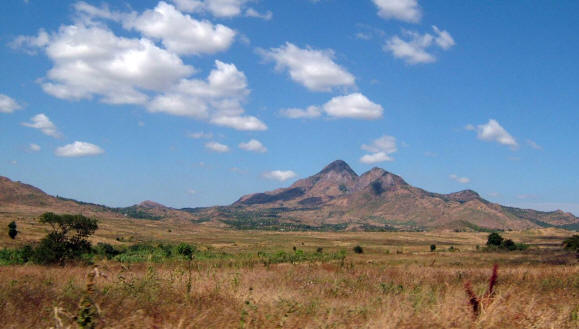
From the high plateau near Blantyre it is possible to see high peaks in every direction – the highest being Mt Mulanje at 9000 ft.
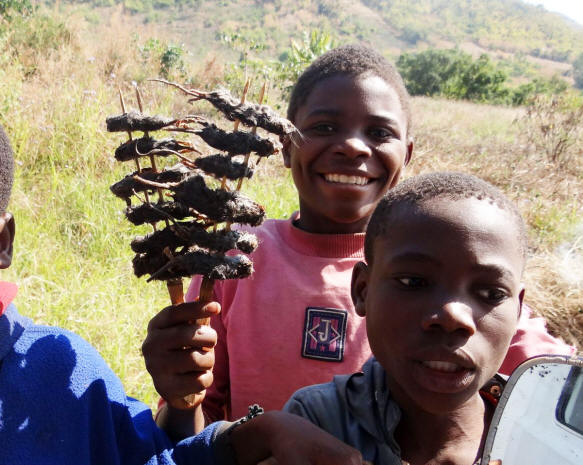
Hungry? This was a new one for us – roasted, furry mice on a stick. Like in Laos, poverty seems to stretch the limits of the food chain.
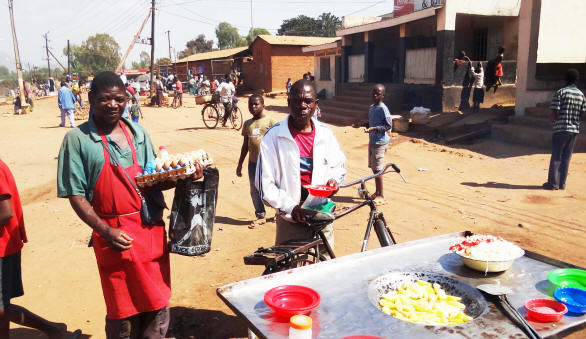
An old stainless steel sink had been converted into a thriving business of sizzling hot chips. Add a dash of chili, a sprinkle of salt, some good conversation with the locals and you are back on your way.
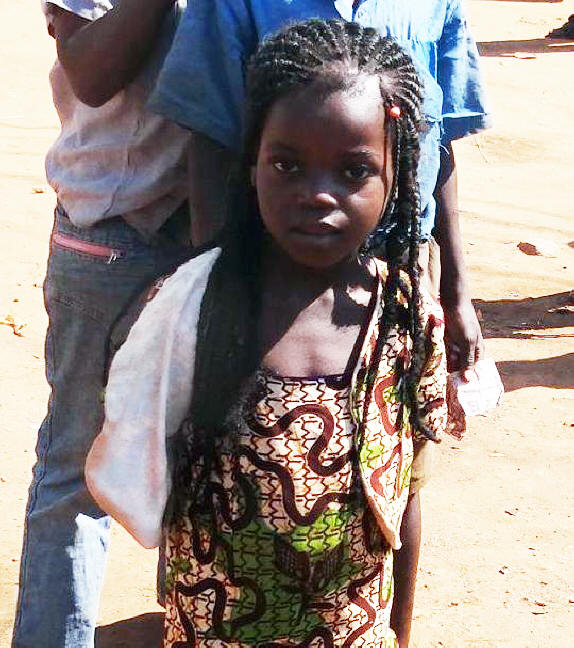
Cute little princess sporting long dread extensions. Hair braiding is an art form in Africa.

Where’s Waldo? Our van, ‘Maari Safari’ blends right in any roadside market.
Driving through the Shire Highlands reveals velveteen green tea estates, Malawi’s second biggest export (following tobacco) of this agrarian economy. Stand after colorful roadside stand sell mountains of juicy red tomatoes, green avocados, yellow papayas or paw paws and golden potatoes. A real vegans delight. We love creative small business enterprises. Further on, an old stainless steel sink had been converted into a thriving business of sizzling hot chips. Add a dash of chili, a sprinkle of salt, some good conversation with the locals and you are back on your way down the road. Although there are 6 local languages in Malawi, Chichewa is most commonly spoken. The official language is English so there is always someone around who can answer your questions. Zomba makes a colorful stop with a lively market, locally carved life size warriors, chief’s chairs, large clay pots and comical ‘mud heads’.
The lake. The lake! Originally headed for busier Cape McClear, we found ourselves mesmerized by the quaint serenity of Monkey Bay, a fitting destination for the two of us! Missionaries from the days of Livingston were also drawn here. A small graveyard on the side of the hill marks their final resting place, victims of malaria. Too bad they didn’t have MMS to help them. (see our ‘Thoughts on Health’ page.) Landlocked in the Great Rift Valley this tiny country was crisscrossed by trading routes with Arabia, India and China; long before Europeans arrived. Lake Malawi, the 3rd largest lake in Africa and one of the deepest in the world, makes up 1/5th of the country. When standing on the shores it is easy to imagine the dark sails of Arabian dhows, sinister as shark fins, in the distance moving gold, ivory and slaves up to the north end of the lake. From there only the strong survived the long march to the coast where the unfortunate wretched captives were sold as ‘goods’ to the middle east. While sharing a bonfire along the shore one star filled night, a young Chichewa man began telling a story. He said that one day, generations ago, a strange looking sailboat pulled up at their village, looking for meat to buy. The men went out to hunt and sold a deer to the Arab traders. The traders went out hunting with the locals the next time, and shot the deer with guns. ‘Wowed’ by this amazing ‘fire stick’ the Arabs easily traded guns with the hunters, showing them how to use them. Newly armed, they convinced these warriors to raid neighboring villages to gather slaves for sale. Blood money. Locals selling locals. Isaac said his great-grandfather was captured from their village on the island across the bay and sold on a ship to the ‘new world’. So he deducted that he, by birthright, should be American. His unknown relatives in the U.S.A. may be famous rap singers or stars in an Afro American sitcom! Who knows?
David Livingston first saw Lake Malawi, then Lake Nyassa, in 1859. Bewitched by its beauty he called it the ‘Lake of Stars’ as the sunlight danced over the cobalt crystal waters. At night the heavens jump out at you, galaxies and the Milky Way twinkling, keeping the name true long after sunset. Not much has changed in over a century and a half. Still we sat mesmerized along the white sand beaches, waves lapping, gazing out over the turquoise water, blue skies and milky distant mountains. Fish eagles soar and screech as they swoop down to grab a fish for lunch. Long and lean Lake Malawi was nicknamed the calendar lake, measuring 365 miles long and 52 miles at its widest point. One of the most diverse varieties of fresh water fish species on earth (over 500 kinds) hide in this deep lake. Although a few larger species exist the majority are cichlids ‘mbuna’, smaller streamline, often brilliantly colored fish. Some resembling sardines are harvested by the ton and seen drying along the shore before being sold in the local markets. The nets of the local fishermen yield few fish, those getting smaller and smaller each year. Fish stew, providing taste and a bit of protein, replaces larger roasted fish of not too many years ago. Numbers are dwindling as resources are drained. Most fish live in the shallower southern regions of the lake, and thus the population density is higher than in the north. Guaranteed that when Livingston was here the huts weren’t so numerous as now.
Overpopulation has taken its toll in Malawi as in most ‘ED’ or economically different countries. With a population of 12 million this country has one of the highest densities in Africa. And with a high fatality rate due to AIDS, over half of the citizens are age 16 or under. Kids, kids and more kids. Poor and without electricity, “We have to have something to do in the dark, we were told beside the campfire.”
Malawi is said to mean ‘reflected light’, from the burning light off the lake or the reflected fire of the dawn. Dawn and dusk mirror glorious colors of apricot, red, tangerine or deep purple in the lake and clouds above. The distant mountains of Mozambique or Tanzania meld into the misty sky as the lake, sky and earth melt into one dreamlike continuum. Reality fades away, ephemeral as the reflected light. These gifts are offered for anyone willing to come with an open heart. This is a world apart.
And so it goes……………………..Next month a closer look at Malawi – this tiny gem hidden deep in the heart of Africa. Until then let’s discover our passion and follow where it leads us. Glad you stopped by. Thanks for keeping in touch – we love getting your emails!

In Mozambique sticky fingers stole Joseph’s one pair of sandals. The only replacement big enough we could find was a size 12 pair of Chinese plastic ‘Crocs’. Walking through the markets of Limbe I spotted a pair of sturdy leather Teva-type sandals in a pile – ‘almost new’ for $4. Saved by second hand recycling!

Enjoying ‘sima’ (white corn meal), 3 types of tasty vegetables and beans; with the locals in the market. All for about $1.
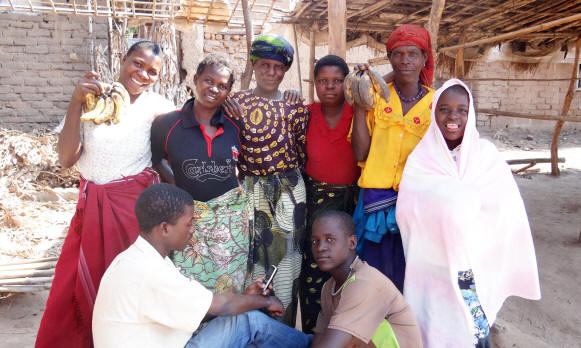
Our fun lady friends at the market. Going to a market 2-3 times a week for 6 weeks you get to know the local villagers. Wonderful people.

Potatoes to make the Irish drool!

Piles of fresh local fruit and dried fish. In fact you never know what you will come across.

Tangy fruit from the local baobab tree – the dry pulp is full
of vitamin C.
Love, Light & Laughter,
xoxoox Nancy & Joseph
Travel notes:
$1.00US = Approx 200 Kwachas
An interesting read: David Livingston’s: “Narrative of an Expedition to the Zambesi and its Tributaries and the Discovery of Lakes Nyassa and Chilwa” (London 1865).
With the cold winds of Antarica reminding us that winter is in full force further south we decided to extend our visa another month. First month is free but the second cost us each 5000 kwachas. Go downtown to the immigration office. If driving you must produce car insurance for another month when renewing your auto permit (another 5000 kwachas). When crossing the border don’t get scammed by the car insurance salesmen. They try to double the amount and get away with pocketing the difference. Prime Insurance is only about 6,000 for the whole year if you are planning to stay longer. Shouldn’t be more than 4,000 kwachas a month. Don’t drive without 3rd party insurance as not having insurance, speeding, or not wearing a seatbelt is an immediate fine. A roadblock await unsuspecting drivers just down the road from all borders.
With dense population in Malawi there always seems to be a village nearby. Just ask to park ‘under the tree’ for the night and there isn’t a problem – aside from many curious visitors!
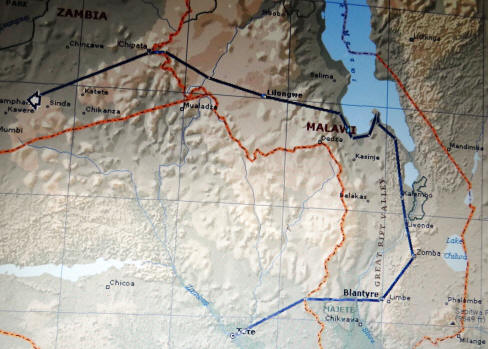

Rosie would get up at dawn twice a week and ride to a larger
neighboring market on the back of a truck, buying vegetables
to resell in the small market. She would pick up special items
for us. Our menu consisted of what was available and in
season. The boy next door would dry roast and salt fresh
ground nuts or peanuts for Joseph as a snack. The whole
market gathered for the big weekly transaction.
—-

Lunch time at Eddie’s garage. One helper cooked sima and a thin stew over a fire. The hard working mechanics would all gather around. The proper way to eat was to squeeze a ball of corn meal then dip it into the bowl of stew. stretching the food out.

Eddie, on the left, was a kind hearted guy, who made us feel welcome as our van was repaired. The little guy in front, a ‘bushman’ in coveralls, kept asking us what kind of gift we had for him. We bought bags of fresh roasted peanuts for everyone before we left.
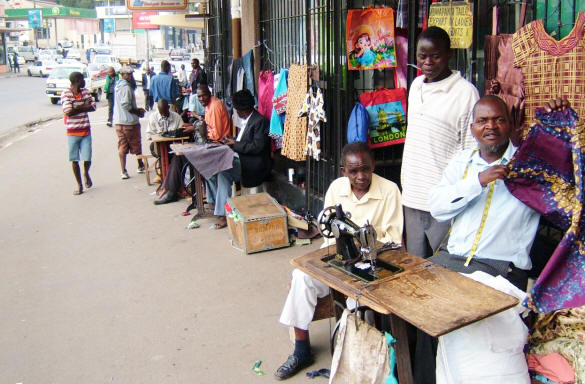
Tailors, sewing bright clothing along the streets of Blantyre.
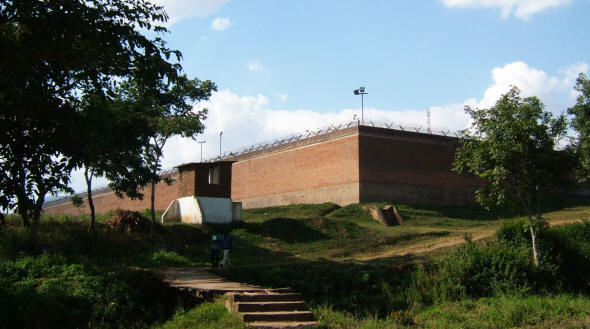
We used to take a short cut past the prison. They crammed over 1700 men and 300 women within these walls, covering only a small area. Incentive not to break the law..
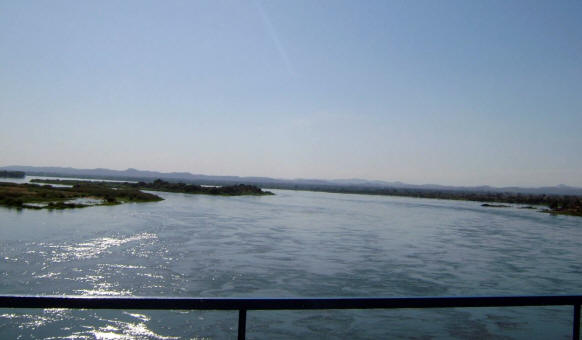
Crossing the Mighty Zambezi into Malawi from Mozambique. The modern bridge is a lot easier than intrepid explorers crossing in canoes dodging crocodiles, on expeditions centuries ago.
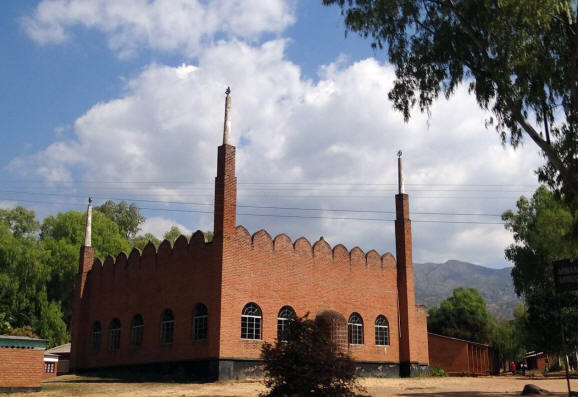
This stylish small mosque was right next to a Christian church. People of all faiths live and work side by side in Malawi.

More majestic mountains of the Malawian Plateau.

A stunning sunset high in the chilly mountains.
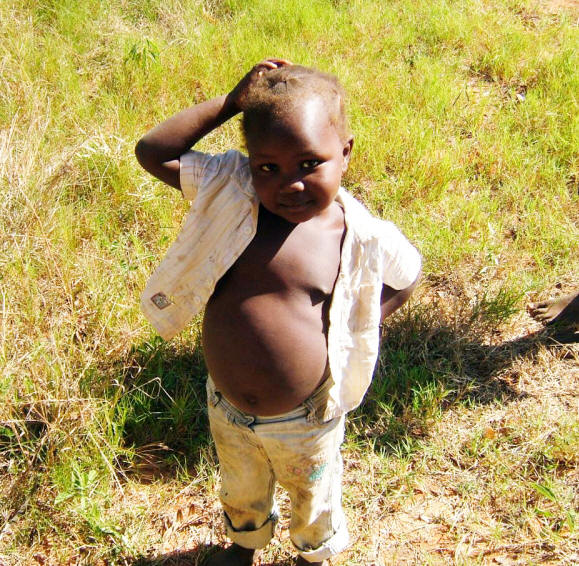
With a type of ‘mange’ on her head and a bloated belly from worms, this little girl was oblivious to her ailments; instead happy and curious.
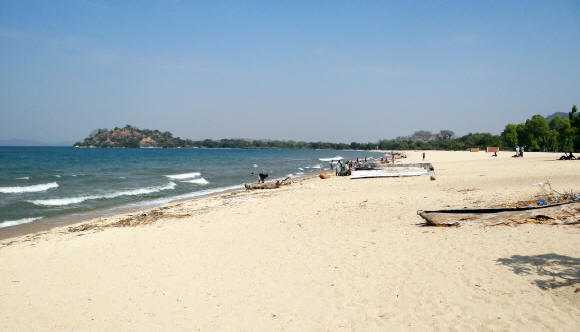
The lake! The lake! After waiting for petrol in Blantyre for 6 days we were happy to finally settle in next to stunning Lake Malawi, named by David Livingston: “Lake of Stars”.
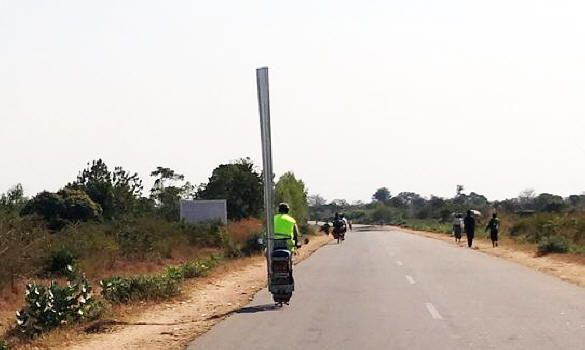
The awkward loads we saw on bicycles, the main mode of transport in Malawi, were incredible. Everything from families of 6, to live pigs, chickens or goats, to hundreds of hand woven baskets, to stacked bags of charcoal 5 high, to sacks of corn meal weighing hundreds of pounds. Necessity promotes ingenuity. We did see quite a few messy spills.

